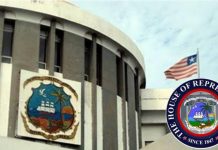Africa-Press – Liberia. The passage stemmed from the submission of a report from the Joint Committee on Post and Telecommunications, Judiciary and Claims and Petition.
At long last, the Liberian Senate has passed the Cybercrime Act of 2025 aimed at establishing a modernized digital and cyber security legal framework in the country.
The proposed Act also seeks to combat internet fraud, amongst others. It was passed with amendments during regular sitting in the Chambers of the Liberian Senate on Tuesday, November 4, 2025.
The passage stemmed from the submission of a report from the Joint Committee on Post and Telecommunications, Judiciary and Claims and Petition.
In its report, the committee pointed out that its review of the draft legislation was guided by a public hearing, relevant legal, technical and policy considerations, including benchmarking against regional and international standards such as those of the Economic Community of West African States (ECOWAS), the African Union (AU), and other best practices from West Africa.
Based on this analysis, the committee recommended the incorporation of specific amendments to the bill. It disclosed that these revisions aim to enhance oversight, accountability, international cooperation, data protection and the enforcement mechanisms of the Act.
Administration and Institutional Framework
The committee amended Section 35 on Composition of the Liberia National Cyber Security Council (LNCC) by adding the Financial Intelligence Agency (FIA) as a permanent voting member.
It recommended the revised Composition of the Act as the Ministries of Posts (Chair), Justice (Co-Chair), Finance, Defense, the Central Bank of Liberia (CBL), Liberia Revenue Authority (LRA), National Security Agency (NSA), Liberia Telecommunications Authority (LTA), Liberia Computer Emergency Response Team (LCERT), FIA, Private Sector (2 members), Civil Society (1 member).
It called for LCERT to be funded through the National Budget, with its allocation submitted under the annual budget of the Ministry of Posts and Telecommunications for legislative approval.
It included Section 5A – International Cooperation in the proposed Act, calling for Liberia to accede to and implement international instruments including Budapest Convention on Cybercrime, African Union (AU) Malabo Convention and other relevant treaties promoting cross-border cooperation.
Under Section 9A-Technical Standards and Guidelines, the proposed Act indicates that LCERT shall publish mandatory cyber security standards such as: Advanced Encryption Standard (AES-256), Transport Layer Security (TLS 1.2 or higher), Compliance with ISO/IEC 27001 or National Institute of Standards and Technology (NIST) frameworks and Regular security audits and penetration testing.
Under Section 9B – Sector-Specific Cyber security Compliance, the proposed legislation stressed that the LCERT shall mandate enhanced standards for financial institutions, Telecommunications Providers, Healthcare Facilities.
It also called for specific regulators in the sector to collaborate with LCERT for enforcement.
Section 28A on Admissibility and Handling of Digital Evidence of the proposed Act calls for digital evidence to require a court warrant, with the preservation of chain of custody, authenticity, and integrity.
“The Ministry of Justice (MoJ) and LCERT shall issue forensic procedures.”
Section 42A on Mandatory Reporting of Data Breaches calls for Institutions to report data breaches to LCERT within 72 hours, and the prompt notification of affected individuals.
It pointed out that penalties would also be applied for failure to report cybercrimes.
Section 55A of the document on Whistleblower Protection calls for the protection of individuals reporting cybercrimes in good faith from liability and retaliation. It maintains that retaliation against whistleblowers shall be criminalized.
The proposed Cybercrime Act of 2025, as amended, provides Liberia with a robust, legally sound, and internationally aligned framework to address emerging digital threats, secure national systems, and protect citizens’ rights in cyberspace.
It provides an effective and unified legal, regulatory and institutional framework for the prohibition, prevention, detection, prosecution and punishment of cybercrimes in Liberia.
It intends to ensure the protection of critical national information infrastructure; promote cyber security and the protection of computer systems and networks, electronic communications; data and computer programs, intellectual property and privacy rights.”
It named access, unauthorized data interference, identity theft, distribution of harmful data/messages, and other threats to digital systems as some cyber offenses
It called for procedural powers to include: Search, seizure, preservation of data and interception of electronic communications with a court search and seizure warrant.
For More News And Analysis About Liberia Follow Africa-Press






